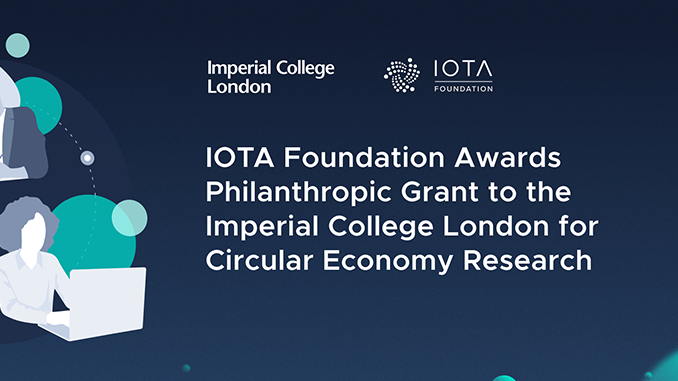
The IOTA Foundation is giving £1 million to Imperial College in London to help set up a new lab there. This will look at use cases of IOTA for the circular economy.
The IOTA Foundation, headed by Dominik Schiener, is discovering its philanthropic streak and giving £1 million to the prestigious Imperial College in London. Schiener justified the move on Twitter by citing the challenges posed by climate change and the opportunity to bring IOTA to the university as part of solutions. He announced that the IOTA Foundation would follow up with other philanthropic (philanthropic) activities. The current gift will be used for practical research on the circular economy.
Many of us have joined #Crypto because we truly believe in the positive impact that we can have. We are here to decentralize, to empower and to create opportunities for everyone.
Lets use the money, knowledge and communities we have to accelerate that impact.#IOTA #Blockchain https://t.co/LwYpc7aQEH
— Dominik Schiener (@DomSchiener) February 3, 2022
To that end, Imperial College will establish an I3 Lab, the IOTA Foundation writes in a blog post. The three I’s stand for Imperial, IOTA and infrastructure. Circular economy is the approach of using resources in the most durable way possible. Consumer goods, for example, should be repaired or recycled, whereas in the so-called linear economy they usually end up quickly in landfills. The future I3 Lab will be located at the Faculty of Engineering. Professors and students there are already working on topics such as smart cities and the sharing economy. The IOTA Foundation has already demonstrated expertise in these fields and aims to bring special attention to the area of waste prevention and use of recycled materials at the I3 Lab.
Two relatively concrete use cases for IOTA have already been identified here for the I3-Lab in advance. On the one hand, IOTA could serve as a basis for setting up decentralized databases. These would record, for example, where and when which materials were used in production and when it would be time to reuse them as part of the circular economy. Easy-to-use apps that access IOTA would also help with this. The gift of money from the IOTA Foundation will also be used to provide financial support to researchers. Imperial College, with its 100-year history, boasts of having produced or employing more than a dozen Nobel Prize winners.
Conclusion: IOTA as a do-gooder?
IOTA co-founder Schiener is not wrong when he emphasizes that many crypto enthusiasts have discovered IOTA, Bitcoin and Co. for themselves also because they want to improve the economy and society with innovative methods. A prominent example of this is Sam Bankman-Fried. He has decreed that 1 percent of the fees collected by the crypto exchange he founded, FTX, go to aid projects. Last year, a good 17 million US dollars were collected, partly through additional and voluntary contributions.
And even if the IOTA Foundation’s presentation of its cooperation with Imperial College is full of buzzwords, the circular economy has long been taken seriously and certainly has more potential than has been exploited to date. The IOTA Foundation already maintains closer ties with universities in Oslo, Vienna and Padua, Italy, for example. Direct cash injections for a university from the IOTA Foundation are a novelty, however, and the multidisciplinary concept of the I3 lab has charm. On the other hand, £1 million for Imperial College is a very manageable sum. Let’s wait and see what comes out of the initiative.
Best place to buy Bitcoin and IOTA:

Leave a Reply